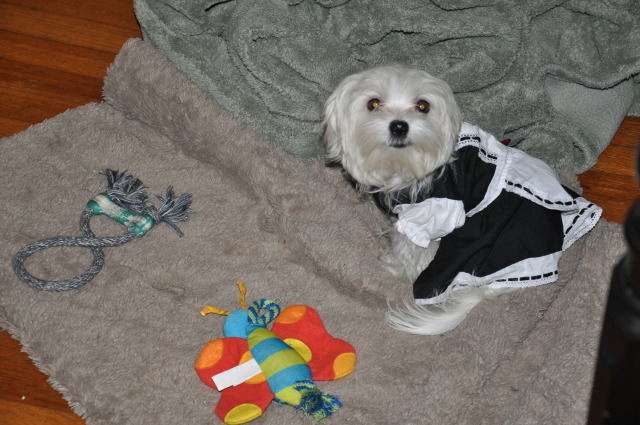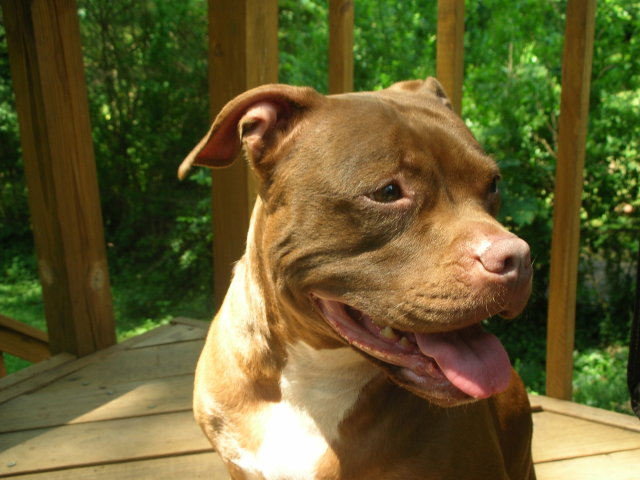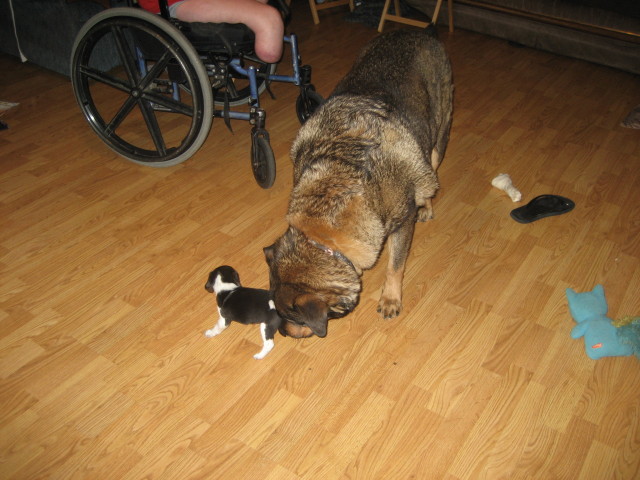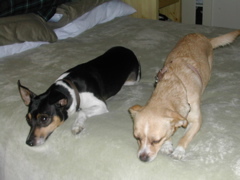QuestionI have had my chocolate lab for all of her life so far, she is 9 years old and healthy. I'm just wondering what the reasons could be for some of her behavioral changes. If its just age or a security issue. Durring the time of the 4th of July she would not go outside easily around 8pm. I thought it was because of the fireworks because she is afraid of them but now that the fireworks have stopped she hesitates to go outside starting at the time of 5pm on. I have to first cokes her to go outside, then once i do that i have to stand in the door way so she doesn't jump right back into the house. Eventually she will run off and pee then run back buts its just a little odd. Also when I'm not home my parents try to let her out and she won't even get near the door for them. I was wondering what could be the source of that?
The second thing is starting today she has taken to laying down in my closet when I'm not in the room or when I'm not home. her eye sight and hearing is just fine. but when i come home or back in the room she will come out and lay on my bed (she sleeps on my bed with me at night so its also her bed as well) its just a little odd, i thank you for your time in helping me understand why she might be doing this :) im just curios it dosn't seem to be harming her in anyway.
AnswerHi Thona,
Thank you for writing to me about your chocolate Lab. She sounds like a really lovely and sensitive dog. I apologize for the delay in responding...it's been extremely busy and I have been trying to catch up with all the questions and answers.
Sometimes a dog will associate a traumatic experience in a way that might not make sense to us humans. From what you have described, your dog may be associating fireworks with the nightime. Dogs have a pretty good sense of time without having to look at a clock like we do.
I also think that the fear she is feeling has made her insecure, which is why she is hiding in the closet, which would feel like a den to her.
Since this is a recent change in behavior, I would suggest that you get a full blood workup done, including a thyroid panel. If the thyroid is out of balance, the result can be behavorial changes.
There is a product called a Thunder or Anxiety wrap. You can find it on www.sitstay.com/ Many people have found that it helps their dogs with anxiety and loud noises.
You can also use Rescue Remedy in her water bowl (12 drops) and rub some on her gums during the day. This will take some of the edge off her anxiety.
Giving her Melatonin could be the answer to this issue. An article in The Whole Dog Journal reports that one of the most effective treatments for thunderstorm phobia (and general anxiety) is melatonin, an over-the-counter hormone used by humans to treat insomnia.
Dr. Nicholas Dodman and his colleague Dr. Linda Aronson of the behavioral section at Tufts New England Veterinary Medical Center had been looking for something that would help reduce canine thunderstorm phobias when they discovered research papers on the effect of melatonin. Research indicated a positive effect of melatonin on dogs that continually lick their flanks as well as a calming effect on chickens in overcrowded conditions.
Drs. Dodman and Aronson wondered whether melatonin might work on noise phobic dogs. The first dog to try it was Dr. Aronson's own Bearded Collie who had severe thunder phobia after lightening struck very near her house. The effect of the melatonin was dramatic. The dog simply stopped being afraid instead of tearing around the house and digging at the carpets. The melatonin did not put her to sleep, she stayed awake and alert -- just not bothered by the thunder.
Drs. Dodman and Aronson then gave the melatonin to other dogs and produced the same result. Melatonin worked for other noise fears (one dog was afraid of songbirds) as well, including fireworks!
Melatonin is sold in capsules and tablets in health food stores, pharmacies and some supermarkets. It is sold in doses as low as 200 micrograms (mcg.). For most dogs, Aronson prescribes 3 milligrams (mg.) In a few cases, dogs weighing over one hundred pounds needed 6 mg. but that was unusual. Aronson usually gives dogs that weigh less than 30 pounds, 1.5 mg. Although they have not treated any phobic really tiny dogs, Aronson would reduce the dosage further for them.
It's important to read the labels on melatonin bottles very carefully. Some are mixed with herbs or nutrients that may not be safe for dogs. Make sure you buy the correct dosage for your size dog. Remember, there are 1,000 micrograms (mcg.) in a milligram (mg.) so a 200 mcg. pill contains only 1/15 of the amount recommended for a large dog.
Because melatonin is not regulated by any federal agency, the quality varies greatly from manufacturer to manufacturer. If an inferior product is administered, it may not be effective in calming a dog whereas a higher quality product might be. Purchase the product from a supplier you trust and believe in. Some holistic veterinarians sell melatonin and their products might be better quality.
You can give your dog melatonin before you leave for the day if thunderstorms are predicted because it remains effective for several hours. You can also give her Melatonin before taking her out. Give melatonin immediately when you see your dog becoming agitated. If your dog has automimmune disease or severe liver or kidney disease, check with your veterinarian before giving melatonin.
Some pet owners have alleviated their dog's anxiety by dispensing Calm Pet by NutraBest/Natural Pet Nutrition which contains valerian, chamomile, kava kava, St. John's wort and melatonin.
Best Regards,
Shelley Davis

 Potty problems
Question
QUESTION: Hii Okay i have a 6 month old
Potty problems
Question
QUESTION: Hii Okay i have a 6 month old
 Nutrition & Health
Question
Peek-A-Boo!
Hello! I am new to owning small br
Nutrition & Health
Question
Peek-A-Boo!
Hello! I am new to owning small br
 Coping with Incontinence
Question
Abi
Abi, my 8 year old female spayed pit bull,
Coping with Incontinence
Question
Abi
Abi, my 8 year old female spayed pit bull,
 Getting a puppy and dog to get along
Question
RC and Kayleigh
Last Tuesday our dog for 14 ye
Getting a puppy and dog to get along
Question
RC and Kayleigh
Last Tuesday our dog for 14 ye
 Vicious fighting between two females
Question
Alice and Julia
I have two female rescue dogs
Vicious fighting between two females
Question
Alice and Julia
I have two female rescue dogs